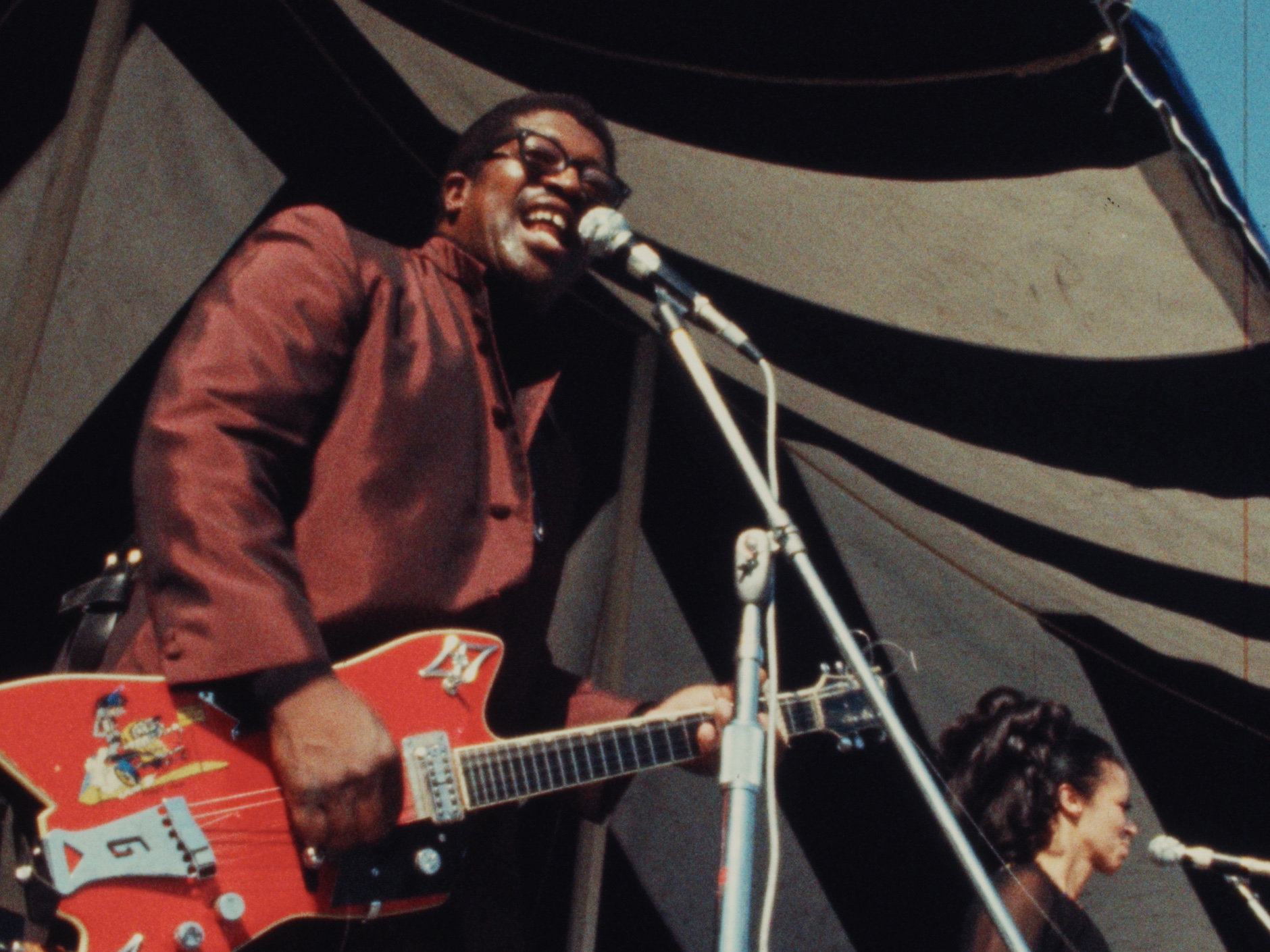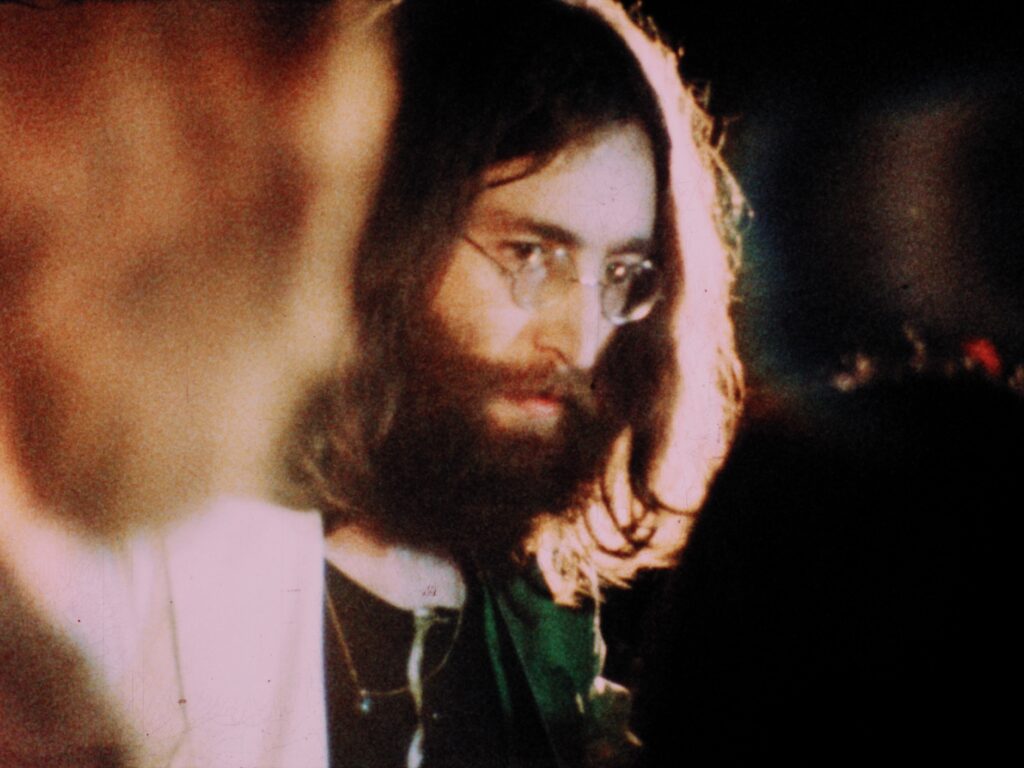
Rock ’n’ roll nerds will have a heyday with the arrival of a new documentary by Ron Chapman, “Revival 69: The Concert That Rocked the World.” Forget, for a moment, the rocking of said world; let’s talk instead about precedents.
The audience holding aloft lighters in order to signal appreciation of the performers? The infamous “chicken incident” that has dogged hard rocker Alice Cooper for more than 50 years? The hiring of a motorcycle gang to provide security measures? These milestones, however momentous or ignominious you might consider them, originated on September 13, 1969, at Toronto.
Also, the Toronto Rock ’n’ Roll Revival 1969 was the occasion on which the last nail in the coffin was set into place for the Beatles as a working band. As John Lennon points out in a contemporaneous interview clip, the group was already beginning to splinter. Ringo Starr had hightailed it for a time, as had George Harrison. Lennon’s relationship with a Japanese Fluxus artist, Yoko Ono, was leading into non-Beatle-centric realms. Something had to give. Still and all, Lennon needed a push.
Enter John Brower, a 20-something Canadian concert promoter in desperate straits. Working with his partner, “moneyman” Ken Walker, Mr. Brower mounted a successful rock festival in June 1969 with an impressive docket of musicians, including Sly and the Family Stone, the Band, the Velvet Underground, and Dr. John. Hoping to capitalize on that success, the two men began mounting a follow-up, the Toronto Rock ’n’ Roll Revival, and secured a bevy of pop music pioneers: Bo Diddley, Jerry Lee Lewis, Little Richard, Chuck Berry, and Gene Vincent.
Yet the flower children weren’t having it with these Las Vegas mainstays. Even when Walker and Mr. Brower managed to add The Doors to the line-up, ticket sales stayed flat. The two sent for a Los Angeles DJ, Rodney Bingenheimer, and a music industry wheeler-and-dealer, Kim Fowley, to stimulate interest. Nothing going. When the plug was about to be pulled on the concert at the 11th hour, Fowley suggested that Mr. Brower give John Lennon a ring, as he was a huge fan of the ’50s rockers on the bill. All Lennon could do was say “no.”

Of course, a “no,” in the case of Mr. Brower, betokened a meeting with fate or, rather, a chief member of a motorcycle club known as The Vagabonds, Ed Leslie. Mr. Leslie, known by the moniker “Edjo,” had loaned Mr. Brower $25,000 to defray the costs in mounting the concert. Should it be canceled — well, there’s no telling what a motorcycle club might do to an ambitious young promoter unable to pay back its monies. Suffice it to say that Mr. Brower is still with us, as is Edjo, who seems quite the affable sort some 50 years after the fact.
Lennon agreed to play at the concert — with only 24 hours’ notice and no band to speak of. By hook and by crook, as well as wielding a Beatle’s influence, he managed to corral guitarist Eric Clapton, bassist Klaus Voorman, and drummer Alan White, who, along with Ms. Ono, formed the nucleus of the Plastic Ono Band. The concert promoters didn’t have funds to pay the group, but they did guarantee Lennon and company first-class tickets to Toronto.
“Revival 69” is, only tangentially, a concert movie. What music footage exists came courtesy of D.A. Pennebaker, the documentary filmmaker responsible for pop culture artifacts like “Don’t Look Back” and “Monterey Pop” (both 1967). Truth be told, the performances are ragtag. The Plastic Ono Band ran through some oldies with a notable lack of cohesion and ultimately ceded the stage to Ms. Ono’s Conceptualist shenanigans. The Doors weren’t filmed at all due to a run-in between Jim Morrison and Pennebaker.
Still and all, Mr. Chapman has put together a diverting movie. A variety of talking heads add the requisite color and commentary. The bassist for Rush, Geddy Lee, recounts an acid trip taken during the concert. Mr. Cooper and his longtime manager, Shep Gordon, talk about improbable relationships — Alice Cooper and band backing Gene Vincent, for instance — and the limits of avant-gardism. And then there’s Mr. Brower, who testifies, in so many words, to his gratitude at not having his knees capped.
A nagging question remains: If the Toronto Rock ’n’ Roll Revival was, as Mr. Brower claims, “the second most important event in rock & roll history,” then what was the most important event? Could that have been Woodstock or, perhaps, the break-up of the Beatles? The formation of the Beatles? It’s left unclear. Rock nerdists want to know.






